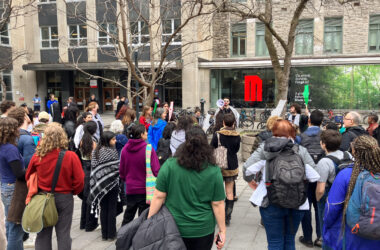The First Nations University of Canada, North America’s only fully accredited Aboriginal university, has had a rough year.
The school’s future is up in the air after losing over $12 million dollars in provincial and federal funding cuts in late January and early February. The cuts were in response to a long, complicated series of administrative problems.
The university – which was founded in 1976 as the Saskatchewan Federated Indian College and has three campuses, all in Saskatchewan – has been in full crisis mode since Saskatchewan Advanced Education Minister Rob Norris’s February 3 announcement that the province would stop funding the school in September. Students have held multiple rallies to try and save the institution, and faculty members have started a “Fund First Nations University Now!” blog.
Norris’s announcement stated that the province had “lost confidence in the governance and management of the school.” Indian and Northern Affairs Canada (INAC), which withdrew its $7.3 million annual support a few days later, cited similar reasons.
“For some time now, [we have] worked with the First Nations University of Canada to address long-standing and systemic government and management issues,” said Margot Geduld, an INAC spokesperson.
In the short term, the two cuts were direct responses to allegations of corruption by former chief financial officer Murray Westerlund. In a lawsuit filed on December 17, Westerlund claimed that he was fired in early December because he had submitted documents to an auditor that revealed questionable spending by the university’s administration. The documents allegedly revealed that top administrators had been taking big payouts for vacation leave and had filed extravagant expenses for business trips.
But these allegations are only the latest episode in the school’s troubled history. The biggest issue has involved what many claim to be an overtly political Board of Governors that has repeatedly prioritized its own political interests over the university’s academic well-being. The Board has several members appointed by the tribal leaders of the Federation of Saskatchewan Indian Nations (FSIN), the governing body of all First Nations in the province.
Aboriginal education expert and 32-year FNUC faculty member Blair Stonechild criticized the way that chiefs have stubbornly held the Board seats.
“There was a governance model here that was based on this concept of ‘Indian control of Indian education,'” he said, “but [their] interpretation of that was that it meant that chiefs were entitled to sit on the board, and they basically didn’t want to have it any other way, and they couldn’t understand any rationale for not having it that way.”
The school’s problems began in February 2005 with controversial actions by then-FSIN Vice-Chief and FNUC Board Chairman Morley Watson. Watson suspended and replaced senior university managers and ordered an audit of the school’s finances without the approval of the Board. After an FSIN Task Force’s recommended remedies were ignored, the Association of Universities and Colleges of Canada (AUCC) conducted its own investigation. Concluding that the Board was violating the university’s independence, the AUCC put FNUC on probation in April 2007. Although AUCC released the school from probation the following year, Stonechild filed an academic freedom suit that led the Canadian Association of University Teachers to censure it in 2008.
“The faculty believed that there had been political interference, that there had been unwarranted intrusion into the affairs of the institution,” said Stonechild, who filed the suit.
The school appeared as though it might fold after the funding cuts, and it is far from safe. However, Arizona lawyer Manley Begay released an important report last week on the school’s government, and his recommendations for a depoliticized Board will be debated at the FSIN legislative assembly from March 8 to 9. And according to a February 17 report in the Regina Leader-Post, a working group will build a proposal in the upcoming weeks that would tie FNUC closer to the University of Regina.
Geduld said that the federal government will remain in “listening mode” to negotiations between the province and the schools, but that, for now, INAC remains committed to its withdrawal. Indian and Northern Affairs Minister Chuck Strahl echoed these sentiments in a Leader-Post editorial last Tuesday.
“While I continue to remain an active participant in these discussions, I want to be clear that the Canadian government will no longer directly fund First Nations University of Canada,” Strahl wrote.
Both the province and the government have repeatedly voiced their concern for FNUC students.
“Our priority at this moment is the students of the First Nations University of Canada,” Geldud said, “We’re working with our partners to provide students with the support needed to successfully complete their academic year.”
FNUC’s Students’ Association has organized a rally and spoken before the FSIN Assembly, but declined to comment in any detail on the crisis.
“We’re going to let the politics work themselves out,” said Vice President Cadmus Delorme.








